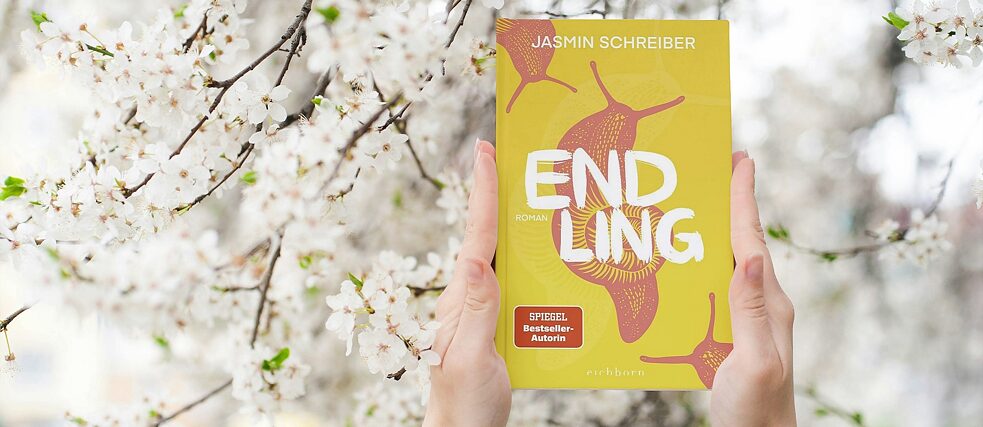Cherrypicker | Literature
Endings and endlings

Jasmin Schreiber’s third novel takes us on a road trip set against a backdrop of loss, species extinction and political reprisals in the year 2041. Not to mention plenty of flora and fauna.
“Japp, my aunt has a snail as a pet. […] HP14 was one thing above all: an endling. The last of its kind in other words, the sole survivor of a success story that has continued for millions of years and that would likewise come to an end if this small specimen were to die.” The third novel by Jasmin Schreiber, who is not only a writer but also a biologist, was named after HP14, the pet snail and endling in question.
A repressive era
Her latest book is about Zoe, who is likewise a biologist as well as a beetle researcher. She returns home to look after her sister Hanna and her eccentric Aunt Auguste while her mother is recovering in a rehab clinic. But home is no longer the place it once was now her father is dead: her mother is an alcoholic, her 16-year-old sister keeps disappearing and partying late into the night, und Aunt Auguste no longer leaves the house for fear of germs and diseases. And then Auguste’s friend Sophie abruptly vanishes, so the disparate trio sets off to find her. What follows is a road trip that takes them from Frankfurt to South Tyrol and Sweden. All of this takes place in 2041, a year characterized by climate change and species extinction. What is more, Germany is ruled by a right-wing populist government that has outlawed abortion and contraception.Jasmin Schreiber writes about loss on all levels – from the personal to the global – with unerring accuracy. She presents a family story that is heart-warming and just a touch offbeat, and makes it clear that everyone deals with grief in their own way. That’s exactly why the title Endling is so apt: for the author, it is “perhaps the saddest word she knows,” a word that “not only describes a biological or cultural state but also has a deep emotional sense”(FAZ).
Travels with a snail
HP14, the endling snail, naturally has to come on the trip too, and even goes with them when Zoe, Hanna and Auguste climb up into the South Tyrolean mountains, where they discover flora and fauna that has long since become extinct elsewhere, not to mention a legendary village populated only by women. Bizarrely, men rapidly fall seriously ill there …. Sophie has already moved on, however, namely to Sweden, where by the end of the book the protagonists get lost in a dark forest – in which the same phenomenon as in Italy can be observed: extinct plants and animals are thriving and there is a hidden village of only women. Is magic at play, or is science responsible? While the author leaves this question unanswered, her more rationally minded characters regard the phenomenon as something that has yet to be researched.Jasmin Schreiber’s book, though dystopian, is nonetheless very close to our reality, which gives the story even greater impact. It is a response to the question “What would happen if?” with a good portion of “Things could really turn out that way”. Despite all the darkness, however, there are also glimmers of hope in Endling – such as the remote female settlements with intact flora and fauna or the online underground network “Night Owls” that provides reproductive health advice for women.
Feminism and insects
The book is also feminist in nature, repeatedly stressing women’s rights to their own bodies and the power that women can have when they join forces. The perfectly organized women’s villages that provide a safe haven for those fleeing from government reprisals or violent partners are one example. Another are the Night Owls, who run an illegal online portal and risk being arrested for their underground activities. Schreiber portrays complex female protagonists and writes sentences that will resonate with many women: “Despite everything, Hanna was just as wild as small girls always are before they begin to be folded and distorted like origami paper and transformed into silent and pretty-looking swans.”The novel is also about family, our planet, the climate, sticking together, grief, loss and resistance, and about hope. Jasmin Schreiber strikes just the right note in Endling: while the book teaches the reader a lot about insects and biodiversity, it is never schoolmasterly in tone. For such a serious topic the writing is casual but never derogatory; it is multidimensional and clear in style. Tara Wittwer may well have come up with the best summary of Schreiber’s work: “A novel that is beautiful and unsettling – and so feminist on so many levels that I didn’t want it to end.”
Jasmin Schreiber: Endling. Roman
Köln: Eichborn, 2023. 334 p.
ISBN: 978-3-8479-0145-7
You can find this title in our eLibrary Onleihe (also as audiobook)